Will Smith returns in the brutal Emancipation , while Jim Parsons and Tilda Swinton grapple with grief
- Oops!Something went wrong.Please try again later.
- Oops!Something went wrong.Please try again later.
- Oops!Something went wrong.Please try again later.
- Oops!Something went wrong.Please try again later.
- Oops!Something went wrong.Please try again later.
- Oops!Something went wrong.Please try again later.
Emancipation
(In theaters and on Apple TV+ now)
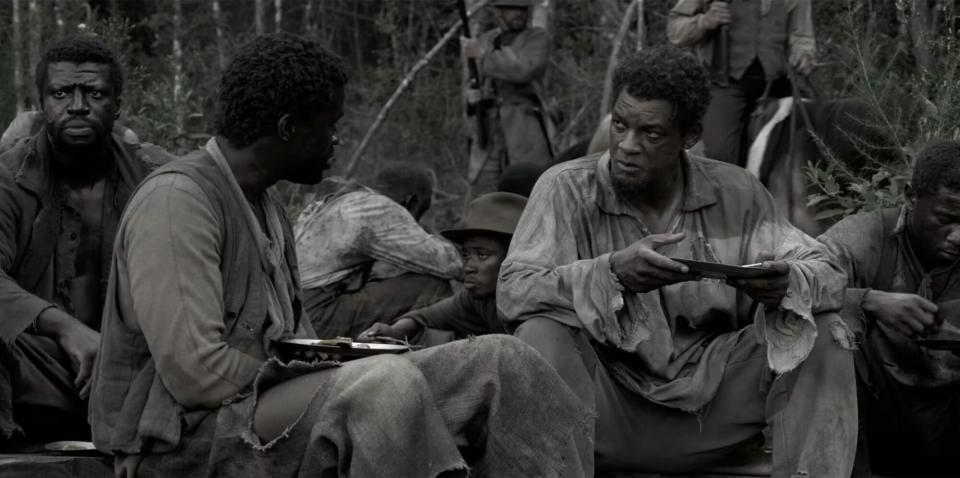
Apple TV+ Will Smith in 'Emancipation'
What we know for sure about a man called "Whipped Peter" is as scant as a picture and a paragraph: He was enslaved on a Louisiana plantation and escaped; he somehow survived 40 treacherous miles of swamp and made it to a Union safehold in Baton Rouge, where a portrait of him stripped to the waist — his back a constellation of keloid scars incurred from a vicious whipping — became a galvanizing spark for the abolitionist movement.
That notorious photograph doesn't appear until deep into the second hour of Emancipation, maybe because Peter's place in history is the thing the movie finds least interesting about him. Instead, director Antoine Fuqua reimagines him as the almost superhuman action hero of a harrowing and often baroquely violent revenge thriller: a bloodied but unbowed warrior battling a raft of savage beasts (alligators, water snakes, Confederates) to make his way homeward at any cost.
Will Smith, his cheekbones hollowed and eyes burning, plays Peter as a devoted family man and faithful Christian pawned off against his will to lay tracks for a distant train line while the Civil War rages. The railroad camp he's sent to turns out to be a sort of murderous gulag, a place where enslaved workers are beaten and killed with a malice so casual and consistent it feels like nothing less than institutionalized sadism. There are no good men here, only more or less merciful deaths, supervised by a sociopathic overseer called Fassel (Ben Foster, leaning in).
That's where Peter's escape — and the many fanged and four-legged hazards of the natural world — come in, and Fuqua (The Guilty, Training Day) hurtles through his swamp-survival narrative with an urgency that feels both stripped-down and operatic, framing it all in grand God's-eye vistas and excruciating closeups stripped almost completely of color, like a tinted old-time daguerreotype.
Whether moviegoers need more punishing stories of Black pain in 2022 has become the subject of much debate — as does the question of suspending Smith's own ideas of vengeance while watching him wreak it so righteously on screen. But he's also still very much a movie star, and his conviction carries Emancipation a long way, elevating what is essentially a B movie to the realm of something better than its outsize premise seems to suggest: a blunt instrument, maybe, but a brutally affecting one too. Grade: B —Leah Greenblatt
Spoiler Alert
(In theaters now)
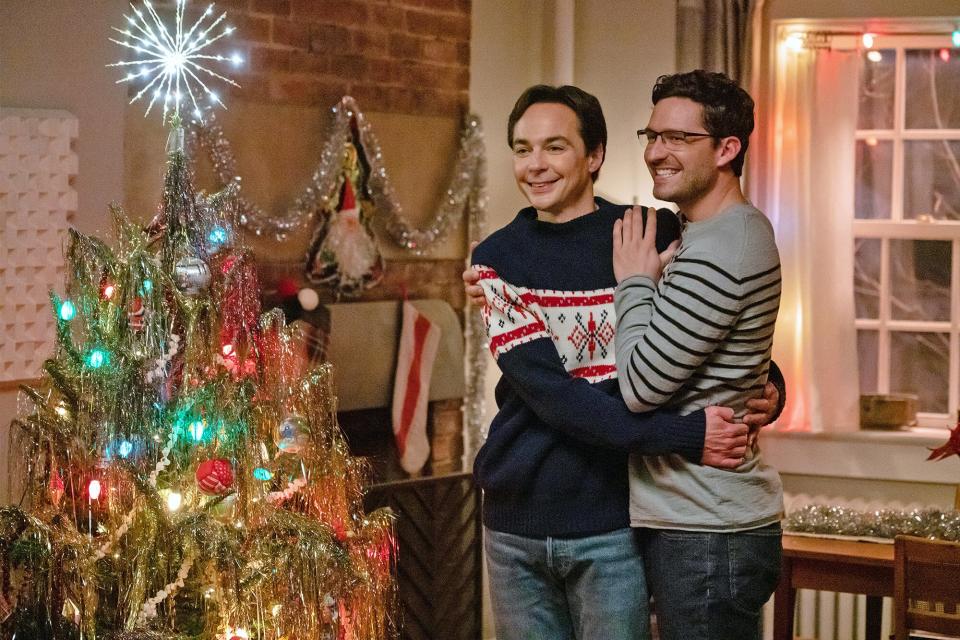
Giovanni Rufino/FOCUS FEATURES Jim Parsons and Ben Aldridge in 'Spoiler Alert'.
Just like its source material — TVLine founder Michael Ausiello's bestselling memoir Spoiler Alert: The Hero Dies — this heartbreaking love story lets you know from the start that Michael (Jim Parsons) will lose Kit (Ben Aldridge) to a rare and aggressive form of neuroendocrine cancer. Getting that out of the way up front frees director Michael Showalter (The Big Sick) from any inclination to inject a sense of manipulative hope that there will be a happy Hollywood ending.
Instead, the film sits in the reality of a 14-year romance, spending most of its 112 minutes exploring slices of a life spent together long before Kit's health deteriorates. Anchored by the ridiculously charming Aldridge's chemistry with Parsons (distant but effective in comparison), Spoiler Alert defies expectations throughout, refusing to adhere to one genre or storytelling convention. Some unexpected twists are successful (a multi-cam sitcom setting provides Michael's backstory) while others are jarring (one hard left turn in the final act, in particular), but Showalter ultimately succeeds because he never loses focus of the heart at the core of his story. Grade: B+ —Patrick Gomez
Sr.
(Now streaming on Netflix)
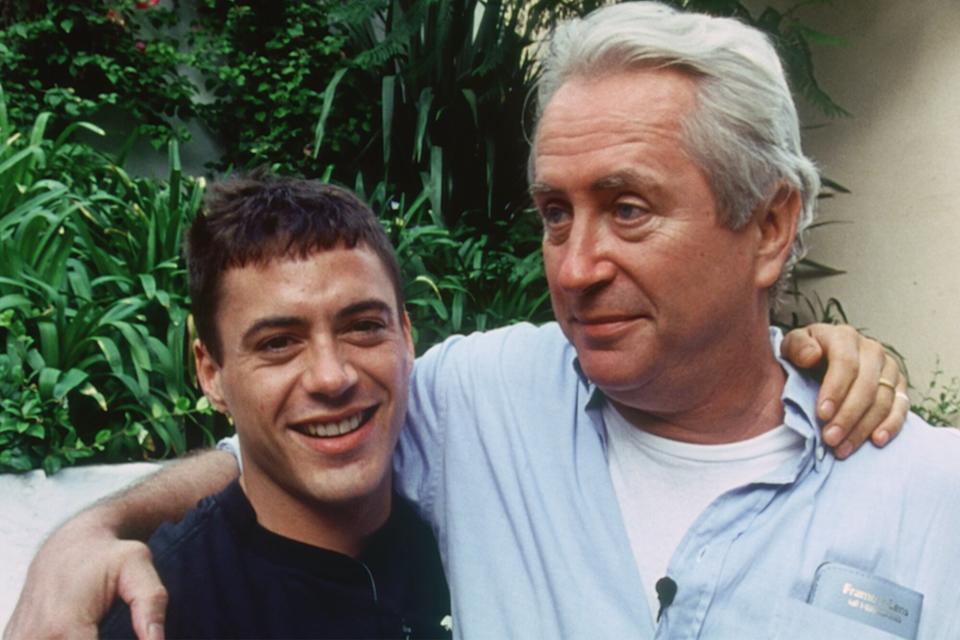
Netflix
As an actor, Robert Downey Jr. has taken on the origin stories of everyone from Charlie Chaplin to Iron Man. Sr., now streaming on Netflix after traveling the festival circuit this fall, might be the closest we get to his own: an intimate, discursive document of his relationship to his late father, the cult filmmaker and general counterculture hellion who shares his name.
Shot mostly during the pandemic by veteran director Chris Smith (Fyre, 100 Foot Wave) and studded with vintage home movies and archival news clips, the movie traces the original RDJ's rise in the riotous scene of 1960s and '70s underground cinema, and the equally lawless parenting bestowed on his two young children at the time — a kind of footloose bohemian anarchy that famously including introducing class-A drugs to his barely-adolescent son.
The much-documented addiction issues that followed Jr. well into adulthood are often addressed here, though with a discretion that verges on euphemism; Sr. does not come to settle scores or assign blame, but to celebrate what remains: a rowdy, beloved patriarch who passed on his love of all things cheeky and profane, and an indubitable artist's spirit. (Even well into his eighties, he retained his auteur's eye; the narrative is threaded through with scenes from the elder Downey's own edits of Smith's raw footage).
How all that eventually transformed the man we know into one of the biggest franchise movie stars in the world is also largely left on the floor, and certain bits feel more like family therapy, strictly speaking, than filmmaking (one scene actually is just a distraught Jr. zooming with his therapist). Still, there's something lovely and quietly profound about where the film finds itself in the end: a generational love story that transcends old wounds and misadventures, and even, in its tender final moments, death itself. Grade: B+ —Leah Greenblatt
Violent Night
(In theaters now)
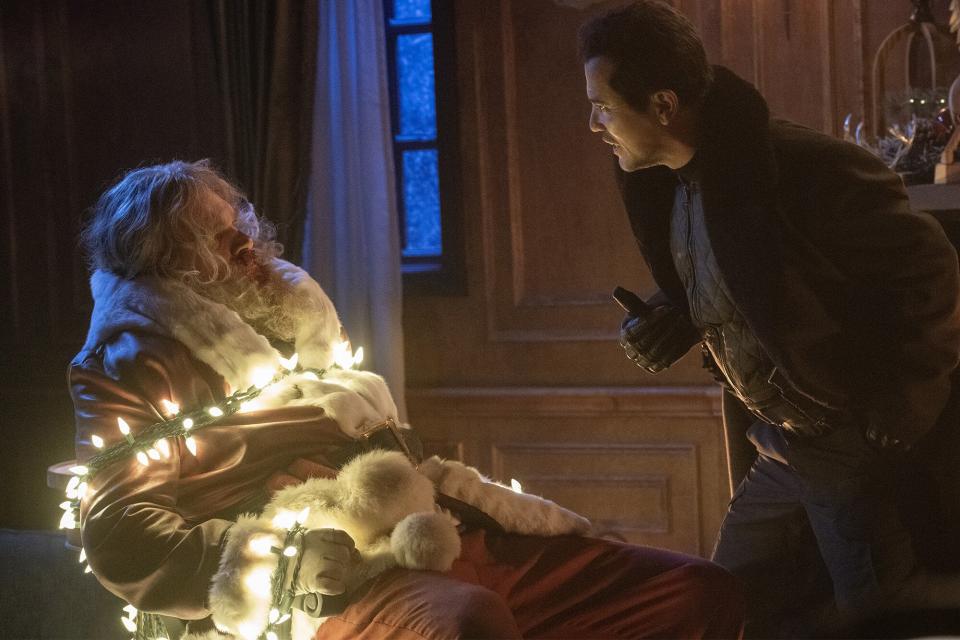
Universal David Harbour and John Leguizamo in 'Violent Night'
By now, the naughty-nice formula of the Christmas action movie delivers little sparkle: vicious Yuletide pummelings, a grumbly Saint Nick in a three-day-old beard, sneaky takeaways of sincerity and heart. You already know the films. Violent Night is another one, and if it lacks the minimalist elegance of something like Die Hard or the subversion of Bad Santa, the movie still gets its points across effectively. Add eggnog to a packed midnight audience and you'll have a fun-enough piece of distraction, as surely as adding water to gremlins gives you mayhem.
The home invaders are a little less clownish this time, led by John Leguizamo as a holiday-hating thief with his eyes on an ultra-wealthy family's vault of cash. And the collected clan itself, circling their inheritances like reality-TV also-rans, is easy to hate, fronted by a sour Beverly D'Angelo. But the good-humored main attraction is a thickened David Harbour as Father Christmas — yep, the actual mythological figure — who in between cookie-scarfing and delivering presents, cuts loose with a one-joke penchant for brutality, his Viking past coming to the fore.
A team of screenwriters more creative than Pat Casey and Josh Miller (best known for two manic Sonic the Hedgehog movies) might have done more with the backstory, and director Tommy Wirkola's beatdowns never transcend the merely serviceable. But there's no denying the joy in a child's eyes when she sees Santa's weapon of choice, a sledgehammer hefted with punishing artistry, and squeals its name: "Skullcrusher!" Sometimes the obvious gifts, even ones you've received several times over, are the most comforting. Grade: B —Joshua Rothkopf
The Eternal Daughter
(In theaters now)
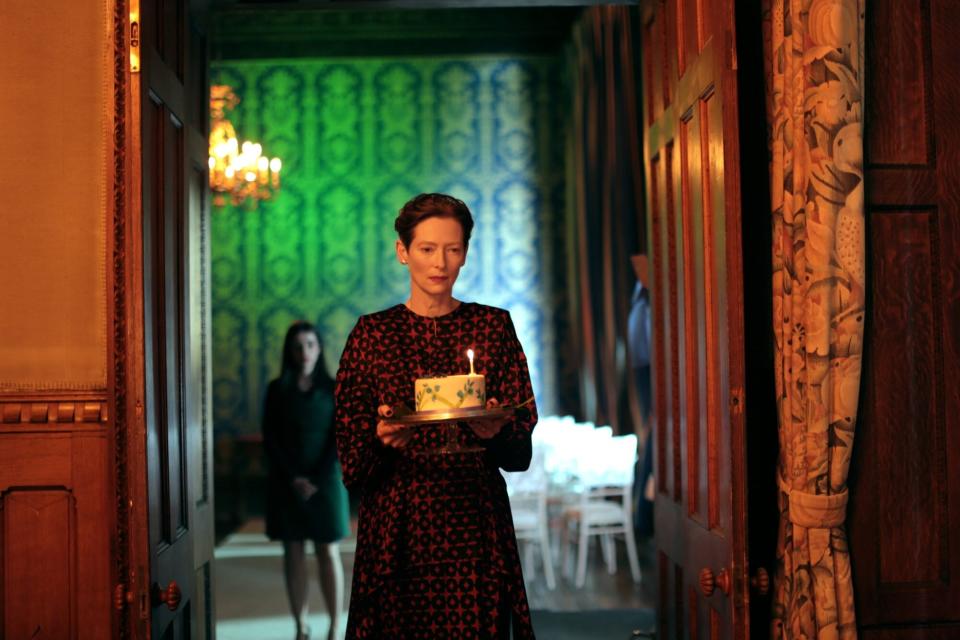
A24
Watching British filmmaker Joanna Hogg convert the misadventures of her early filmmaking days into the Souvenir movies has been a surprisingly fun journey, free of nostalgia or sentiment — and, crucially, loaded with self-deprecating humor. (Maybe you should have a look, Iñárritu.) Obliquely related to her recent films, Hogg's latest is either her slyest joke to date, or another swerve in an especially fecund career phase. You'll never guess that she's had her own version of The Shining waiting to emerge, but that's exactly the case: The Eternal Daughter is a haunted memory palace of ghosts, set in a moaning, near-empty hotel.
The less known about the plot, the quicker its lovely ache will sneak up on you, after an early stretch that's faintly close to Hammer-horror spookiness. Tilda Swinton, so inspired in the Souvenir installments as Hogg's doting mother, is here refracted in a double role, playing both parent and adult child. (It's a mark of Hogg's command that you soon stop looking for the camera trickery.) Both characters appear trapped in a kind of stasis; they're on a rural getaway together, bumbling around the mansion's corridors and walking their dog. Dinner conversations barely hide a ticking desperation, a lunging for connection before it's too late.
If you want symbolism, it's there for you. But as with Charlie Kaufman's metaphysical I'm Thinking of Ending Things, there's a mood that hides the seams in a Kubrickian fog, thick with ancient wallpaper, muted earth tones, and a boxy air of decay. We may be trapped in someone else's memories, but Hogg's takeaway is that perhaps it's a place we'd choose to stay in (forever and ever?), if only we could hold onto the ones we love. For a weekend, anyway, it's a game we can play. Grade: A —Joshua Rothkopf
Related content:

